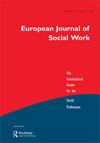Human behaviour in pandemics: social and psychological determinants in a global health crisis
IF 1.6
3区 社会学
Q2 SOCIAL WORK
引用次数: 1
Abstract
necessary tools to go beyond the narrow focus of current studies that– according to the authors – suffer from a fragmented and segregated knowledge base by focusing on particular ethno-national groups or by focusing on specific sectors such as public healthcare or civil society. Moreover, most current studies do not provide a comprehensive overview of the entire welfare ecosystem, including informal dimensions of provision (Schrooten, Thys & Debruyne (eds) (2019) Sociaal schaduwwerk. Politeia), a perspective that is well elaborated in this book. Another important asset of the concept is its multiscalarism, which includes scapes and resources ranging from the local to the transnational and the virtual. By making visible how resources from all over the world are connected to solve health – or welfare – concerns, the concept has the potential to contribute to overcome themethodological nationalism still present in social work (Schrooten (2021) Transnational social work. Journal of Social Work, 21:5, 1163–1181). Yet, apart from a reference to the existence of transnational and virtual resources, these perspectives are largely absent from the book. The connection of resources across welfare regimes and borders is not elaborated, nor is the transnational or the virtual explicitly included in the ‘welfare ecosystem’ approach developed in the book, which is limited to a local organisation perspective. This is a missed opportunity to pay attention to ‘the hidden’, including transnational resources as well as resources without a formal organisational structure. Further developing these hidden aspects would strongly contribute to the potential of the concept and further enrich its ability to bring innovation to healthcare systems and beyond.大流行病中的人类行为:全球健康危机中的社会和心理决定因素
根据作者的说法,通过关注特定的民族群体或关注公共医疗或民间社会等特定部门,超越当前研究的狭隘焦点的必要工具。此外,目前的大多数研究并没有全面概述整个福利生态系统,包括提供的非正式层面(Schroten,Thys&Debruyne(eds)(2019)Sociaal schaduwwerk。Politeia),这一观点在本书中得到了很好的阐述。该概念的另一个重要资产是其多尺度性,包括从本地到跨国和虚拟的景观和资源。通过展示来自世界各地的资源如何联系起来以解决健康或福利问题,这一概念有可能有助于克服社会工作中仍然存在的方法民族主义(Schroten(2021)跨国社会工作。《社会工作杂志》,21:51163-1181)。然而,除了提到跨国和虚拟资源的存在外,这些观点在书中基本上没有出现。本书中制定的“福利生态系统”方法仅限于从地方组织的角度出发,没有详细阐述跨福利制度和边界的资源联系,也没有明确将跨国或虚拟纳入其中。这是一个错失的关注“隐藏”的机会,包括跨国资源以及没有正式组织结构的资源。进一步开发这些隐藏的方面将大大有助于该概念的潜力,并进一步丰富其为医疗保健系统及其他领域带来创新的能力。
本文章由计算机程序翻译,如有差异,请以英文原文为准。
求助全文
约1分钟内获得全文
求助全文
来源期刊

European Journal of Social Work
SOCIAL WORK-
CiteScore
3.50
自引率
20.00%
发文量
96
期刊介绍:
The European Journal of Social Work provides a forum for the social professions in all parts of Europe and beyond. It analyses and promotes European and international developments in social work, social policy, social service institutions, and strategies for social change by publishing refereed papers on contemporary key issues. Contributions include theoretical debates, empirical studies, research notes, country perspectives, and reviews. It maintains an interdisciplinary perspective which recognises positively the diversity of cultural and conceptual traditions in which the social professions of Europe are grounded. In particular it examines emerging European paradigms in methodology and comparative analysis.
 求助内容:
求助内容: 应助结果提醒方式:
应助结果提醒方式:


